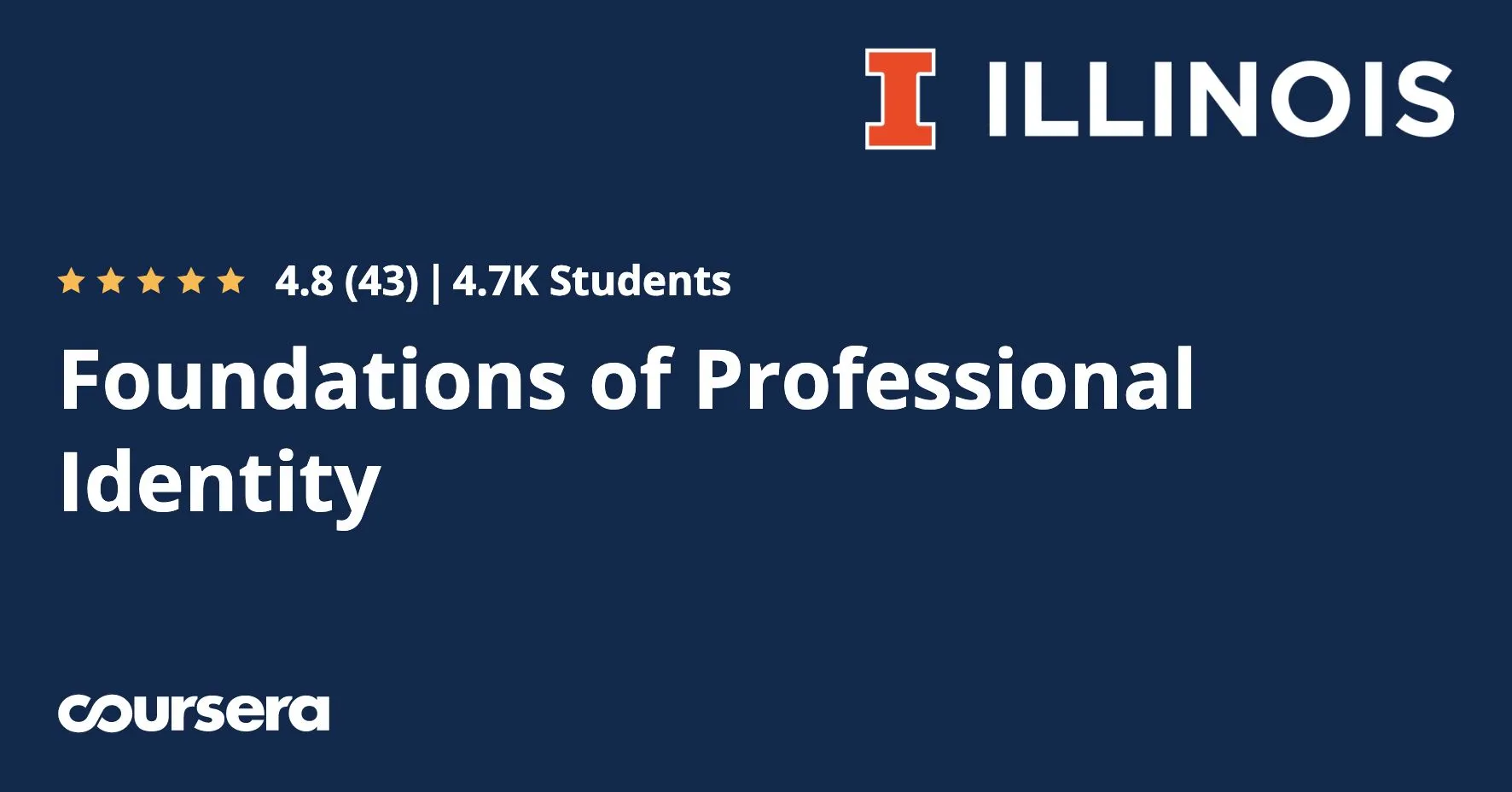
Foundations of Professional Identity 
Professionals can benefit from understanding the foundations of their identity, such as values, beliefs, and goals, to better navigate the challenges of the workplace. This can help them to make informed decisions and build successful careers. ▼
ADVERTISEMENT
Course Feature
![]() Cost:
Cost:
Free
![]() Provider:
Provider:
Coursera
![]() Certificate:
Certificate:
No Information
![]() Language:
Language:
English
![]() Start Date:
Start Date:
Self Paced
Course Overview
❗The content presented here is sourced directly from Coursera platform. For comprehensive course details, including enrollment information, simply click on the 'Go to class' link on our website.
Updated in [March 06th, 2023]
Foundations of Professional Identity is a course designed to help students develop the skills necessary to succeed in their professional lives. Through a combination of lectures, discussions, and activities, students will explore the importance of self-awareness, ethical decision-making, and the development of tools to use in the moment. Students will also learn how to recognize and meet ethical challenges, use an analytical decision-making framework, and identify potential pitfalls. By the end of the course, students will have a better understanding of their professional identity and the skills necessary to succeed in their professional lives.
[Applications]
The application of this course can be seen in the development of professional identity. Participants can use the knowledge gained from this course to build a strong professional identity by understanding their values, developing ethical decision-making skills, and creating tools to use in the moment. Additionally, participants can use the analytical decision-making framework to identify potential pitfalls and develop strategies to avoid them. Finally, participants can use the course to build a positive reputation and become a leader in their field.
[Career Paths]
1. Human Resources Manager: Human Resources Managers are responsible for overseeing the recruitment, training, and development of employees. They are also responsible for ensuring that the organization's policies and procedures are followed. As the workplace continues to evolve, Human Resources Managers must stay up to date on the latest trends and technologies to ensure that their organization is competitive.
2. Business Analyst: Business Analysts are responsible for analyzing data and developing strategies to improve the efficiency and effectiveness of an organization. They must be able to identify trends and patterns in data and use this information to make informed decisions. As technology continues to evolve, Business Analysts must stay up to date on the latest tools and techniques to ensure that their organization is competitive.
3. Project Manager: Project Managers are responsible for planning, organizing, and managing projects. They must be able to identify potential risks and develop strategies to mitigate them. As the workplace continues to become more complex, Project Managers must stay up to date on the latest trends and technologies to ensure that their organization is competitive.
4. Consultant: Consultants are responsible for providing advice and guidance to organizations on a variety of topics. They must be able to identify potential problems and develop solutions to address them. As the business environment continues to evolve, Consultants must stay up to date on the latest trends and technologies to ensure that their organization is competitive.
[Education Paths]
1. Bachelor of Business Administration: This degree provides a comprehensive overview of the business world, including topics such as accounting, finance, marketing, and management. It also covers the fundamentals of professional identity, including ethics, communication, and decision-making. This degree is ideal for those who want to develop a strong foundation in business and professional identity.
2. Master of Professional Studies: This degree focuses on the development of professional identity and the skills needed to succeed in the workplace. It covers topics such as leadership, communication, ethics, and decision-making. It also provides an opportunity to specialize in a particular field, such as healthcare, finance, or marketing. This degree is ideal for those who want to develop their professional identity and gain a deeper understanding of their chosen field.
3. Doctor of Professional Studies: This degree is designed for those who want to become experts in their field and develop a strong professional identity. It covers topics such as leadership, communication, ethics, and decision-making. It also provides an opportunity to specialize in a particular field, such as healthcare, finance, or marketing. This degree is ideal for those who want to become experts in their field and develop a strong professional identity.
4. Master of Business Administration: This degree provides a comprehensive overview of the business world, including topics such as accounting, finance, marketing, and management. It also covers the fundamentals of professional identity, including ethics, communication, and decision-making. This degree is ideal for those who want to develop a strong foundation in business and professional identity, as well as gain a deeper understanding of their chosen field.
The development of professional identity is becoming increasingly important in today's competitive job market. As such, many employers are looking for candidates who have a strong understanding of professional identity and the skills needed to succeed in the workplace. As such, these degree paths are becoming increasingly popular and are likely to continue to be in demand in the future.
Pros & Cons

Provides real time working solutions

Insightful and provoking

Enriching and educative

Practical hints to improve performance

Clear communication style

Peer review assignments difficult

Technical difficulties

Slow start

Time consuming
Course Provider

Provider Coursera's Stats at AZClass
Discussion and Reviews
0.0 (Based on 0 reviews)
Explore Similar Online Courses

Good with Words: Writing and Editing

Free MySQL Tutorial - Infinite Scroll Project AJAX MySQL API PHP jQuery

Python for Informatics: Exploring Information

Social Network Analysis

Introduction to Systematic Review and Meta-Analysis

The Analytics Edge

DCO042 - Python For Informatics

Causal Diagrams: Draw Your Assumptions Before Your Conclusions

Whole genome sequencing of bacterial genomes - tools and applications

Leadership Skills Mastery Vol 1: Leadership for 2019

What is Leadership?


Start your review of Foundations of Professional Identity